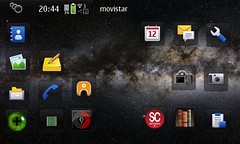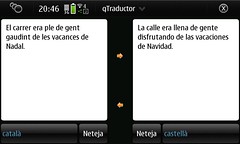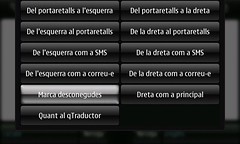Countries that succeed
Submitted by toniher on
In these crucial times for the future of my own country, Catalonia, I could not avoid getting inspired by the following sentences I found in the first chapter of A. Beattie's "False Economy":
Submitted by toniher on
In these crucial times for the future of my own country, Catalonia, I could not avoid getting inspired by the following sentences I found in the first chapter of A. Beattie's "False Economy":
Submitted by toniher on
El passat cap de setmana va tenir lloc a Varsòvia una altra edició del Mozcamp, el nom que reben les trobades internacionals de la comunitat de Mozilla. Concretament de la comunitat catalana vam ser convidats n'Alina, n'Eduard i jo. Malauradament, n'Eduard, que tot just se n'havia anat a Boston, no va poder participar-hi.
L'esdeveniment, amb el sobrenom de 'Mobilize Mozilians', va centrar-se sobretot en la importància d'estendre's al món mòbil.
Submitted by toniher on
Yesterday I realised that this blog is close to 9 years old. I think its first version was based on Drupal 4.x and I remember I kept it installed in my own Linux server at my shared flat room under a 'homelinux.org' subdomain.
After attending Barcelona Drupal Devdays, where many of the talks debated about the upcoming features of Drupal 8, I thought it was time to upgrade my rusty Drupal 6 website to current stable version, Drupal 7. Since soon or later I must upgrade a couple of other Drupal 6 websites, I considered it was worth trying it first in my own personal weblog.
Below I detail some of the problems and difficulties I encountered during the update process. I imagine most of the stuff is related to the fact I've been upgrading for such a long time and because of using certain extensions. Anyway, I hope this can be helpful to other people.
Submitted by toniher on
Ahir llegint el butlletí de maig de l'Associació de Veïns i Veïnes del Clot-Camp de l'Arpa vaig topar-me amb una carta d'un soci que es lamentava de la situació de les escales mecàniques de l'estació del Clot - Aragó (ubicades entre l'Avinguda Meridiana i el Carrer Aragó).
Submitted by toniher on
Last Thursday, during March edition of monthly Barcelona Web professionals meeting (webcatbcn), I presented my recent experiences with offline-aware web technologies such as localStorage and appcache, which I just learnt by improving Softcatalà mobile translator.
Submitted by toniher on
Segons dades d'ús, actualment la penetració del Firefox en català a l'estat espanyol respecte a la versió en altres idiomes és al voltant d'un 4,5% [1]. Amb les estimacions més conservadores, crec que hauríem d'esperar un valor mínim de vora del 7,5%, assumint que la meitat de la població només a la comunitat autònoma de Catalunya pot tenir el català com a llengua d'ús primari.
Submitted by toniher on
De ja fa uns quants anys, les xarxes socials forman part de la vida diària a Internet de la majoria de catalanoparlants. De ben segur que la majoria de gent ja coneix tant el Facebook com el Twitter. En aquest article aprofitarem per fer conèixer aquelles altres xarxes socials que tenen com a element comú el propòsit de facilitar l'existència d'una xarxa distribuïda tot basant-se alhora en programari lliure.
Submitted by toniher on
Ahir al migdia vaig tenir l'ocasió de poder assistir a la presentació al Col·legi de Periodistes de Catalunya d'una parella de Siurana, propietaris d'una empresa familiar de restauració, que han decidit pagar els seus propers impostos a l'agència tributària de Catalunya en comptes de fer-ho a la Hisenda espanyola.
Submitted by toniher on
Durant les jornades «Building Digital Commons», que van tenir lloc la setmana passada a Barcelona, va dedicar-se una de les sessions a la possibilitat d'establir aliances entre diferents organitzacions de l'àmbit del programari i coneixement lliure.
La qüestió ve de lluny i a continuació detallo algunes de les experiències que tinc constància que hi ha hagut en el passat per a portar a terme accions conjuntes.
Submitted by toniher on
El Rebost de Softcatalà és un espai on qualsevol usuari té la garantia que trobarà programari en català per al seu ordinador.
Des de ja fa força temps, vaig poder automatitzar l'actualització de les versions de diferents aplicacions de Mozilla, permetent així que la darrera versió estable de programes com el Firefox apareguessin enllaçades a la respectiva fitxa del Rebost poc després que en el mateix lloc oficial.
Submitted by toniher on
LocalSettings.php. Example:
$wgDefaultUserOptions['editsection'] = 0;However, if the wiki is not new, there could be already several users who will have inherited previous default preferences before any change is performed in
LocalSettings.php.
Submitted by toniher on
A few weeks ago, Softcatalà (a non-profit organization devoted to bringing Internet and new technologies to Catalan speaking community in their own language) held its first open localisation session at Sagrada Família Civic Center. Our main aim was to offer to attendees the opportunity to know more closely the tools and criteria in our localisation processes and, ideally, also engage more volunteers to join our ongoing projects and share our values with them.
Submitted by toniher on
L'altra dia explicava que m'havia instal·lat el GNOME 3 al nou Ubuntu. Malauradament, pocs dies després, en una actualització menor me n'adono que aquest se m'elimina i, pitjor encara, em quedo sense cap sistema d'escriptori1. La solució era doncs recuperar el paquet gnome-shell però, ai las!, des de la consola (Ctrl+Alt+F1) sembla que no tenia connexió sense fils i em va tocar estirar el cable que tenia desat al calaix. Arran d'això, us explico el següent.
Submitted by toniher on
Avís: a continuació explico la meua curta experiència personal provant el GNOME Shell a l'Ubuntu 11.04. Només ho recomano a usuaris experts.
Submitted by toniher on
El servei de traducció de Softcatalà, de fet basat en la tecnologia oberta de l'Apertium, és una de les pàgines més populars del lloc web de Softcatalà. De fa temps hi ha un creixent interès en anar portant tota aquesta funcionalitat a altres entorns, com poden ser les aplicacions mòbils i, per aquest motiu, s'ha creat fa uns pocs dies una llista de desenvolupament per a tal propòsit.
Centrant-me en el títol de l'apunt, de fa ja uns mesos faig servir com a dispositiu mòbil un Nokia N900. L'aparell té com a sistema operatiu Maemo, un entorn molt similar al Debian GNU/Linux, però dissenyat específicament per a dispositius mòbils.
En les darreres actualitzacions del sistema s'ha anat apostant progressivament per les biblioteques Qt —fet lògic considerant que Nokia va comprar Trolltech, l'empresa darrere de les Qt— i, per tant, cada vegada són més les aplicacions Qt que s'hi troben.
Precisament fa uns dies vaig descobrir el qTranslate, un client QT del Google Traductor. Vaig pensar que seria interessant poder tenir quelcom similar per al traductor de Softcatalà i, mans a la feina, en uns pocs dies ja tenim una primera versió. Respecte a l'aplicació pare, he afegit particularitats pròpies del servei, com ara marcar paraules desconegudes o controlar la correspondència entre parells de llengües disponibles (menys al servei de Softcatalà que al de Google).
Si voleu provar el qTranslate, podeu trobar-lo al Rebost de Softcatalà (que progressivament ara també anirà incorporant mòbil) o a diferents repositoris del Maemo. Si en teniu l'oportunitat, no dubteu a valorar l'aplicació i fer-ne comentaris.
Unes poques captures de l'aplicació a continuació:
 |  |  |
Si no s'indica el contrari, els continguts de text propis d'aquest web estan llicenciats sota una llicència Creative Commons Reconeixement - CompartirIgual, com també sota una Llicència de documentació lliure GNU, versió 1.2 o qualsevol altra que posteriorment publiqui la Free Software Foundation); sense seccions invariants (Unvariant Sections), textos de portada (Front-Cover Texts), ni textos de contraportada (Back-Cover Texts).
Logos utilitzats: Fediverse: https://commons.wikimedia.org/wiki/File:Fediverse_logo_proposal_(mono_version).svg, Github: https://commons.wikimedia.org/wiki/File:Octicons-mark-github.svg, Mastodon: https://commons.wikimedia.org/wiki/File:Font_Awesome_5_brands_mastodon.svg, RSS: https://commons.wikimedia.org/wiki/File:Rss_font_awesome.svg, Twitter: https://commons.wikimedia.org/wiki/File:Twitter_font_awesome.svg, Wikiloc: https://www.onlinewebfonts.com/icon/23913